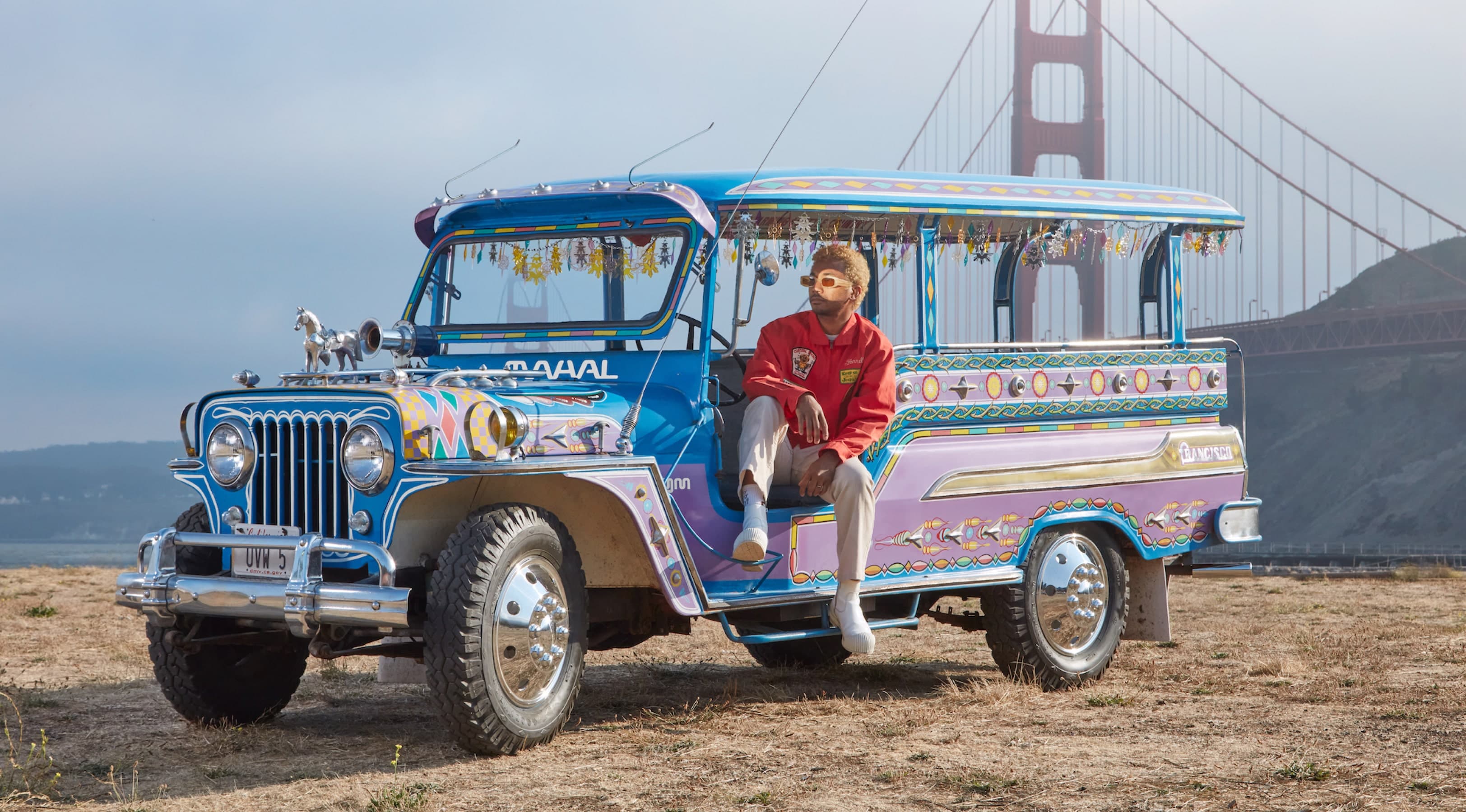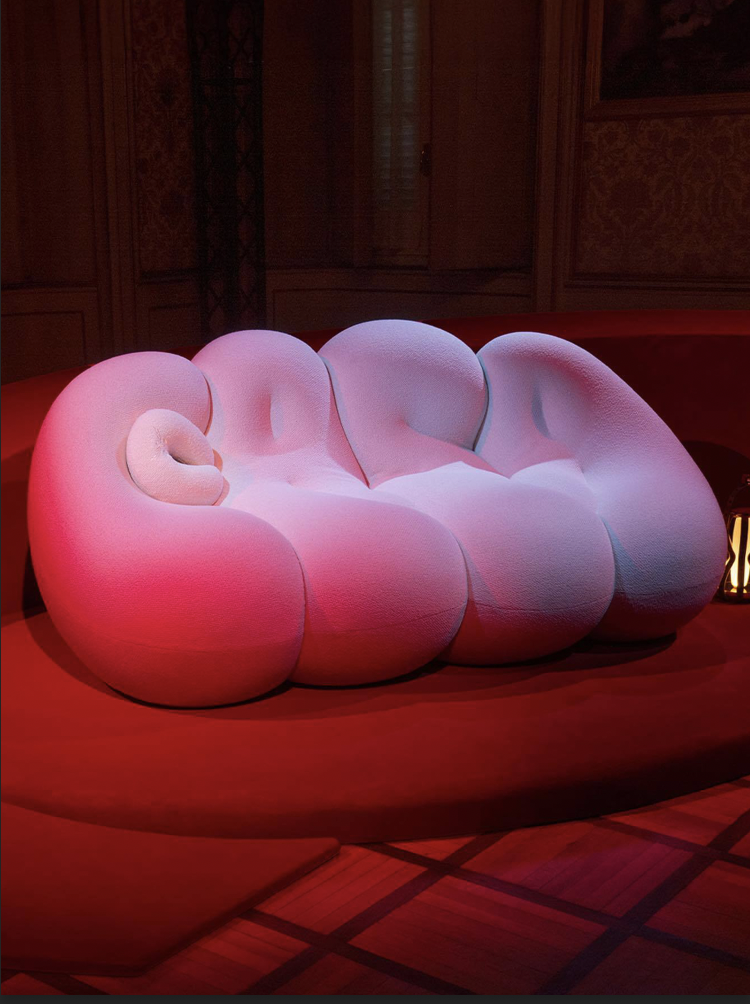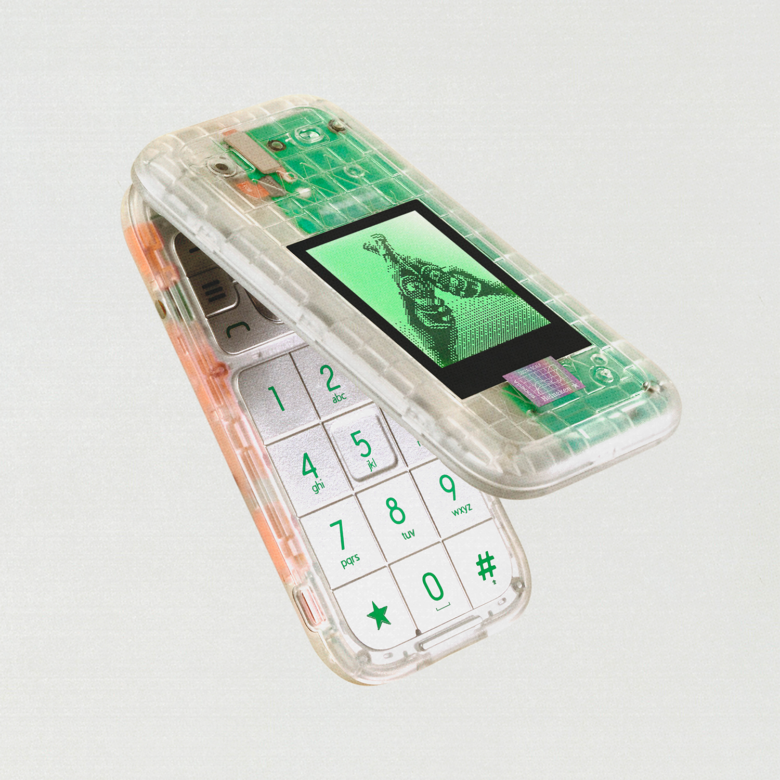Chances are you started listening to Toro y Moi and never stopped. The artist, also known as Chaz Bear, is incredibly prolific, and his work easily, almost seductively, leans itself to repeat listenings. Last week, he released his seventh studio album, Mahal, which opens with an engine rev. It’s fitting; the 13 tracks on the album take the listener on a sonic journey through various genres and sounds, from the psychedelic grooves of the 60s and 70s to 00s indie ease.
In some regards, it’s a typical Toro y Moi album, you have the lush, heady instrumentals of the chillwave movement, which Bear has long been associated with. ‘In the Loop’, in particular, evokes the motion and rhythms of skaters, a group that is intertwined with some of the subgenre’s most recognisable acts; Tame Impala, Washed Out and Still Woozy. But there’s a difference on this album — if not sonically, in its public facing persona and tone. Inspired largely by his Filipino heritage (Bear is half Filipino and half African-American), Mahal leads with the Pinoy national symbol, a Jeepney, which he sourced for the album. He was originally looking for an old jeep when he stumbled upon the authentic Jeepney, which had been brought over to the States in the 60s — it was a case of “cosmic alignment”, he tells me.
It’s a visual that perfectly encapsulates the sense of playfulness on the album, which is evident on tracks like ‘Postman’ and even ‘Days in Love’, whose lyrics jar with the instrumentals. “I’m hoping I can break some new ground as far as giving some insight on who I am and what my sense of humour and taste is,” Bear comments. But the Jeepney also means something more to the musician: “I feel like I’ve represented my Black side throughout my entire career, I’ve never really focused on Filipino culture, partially because it gets overlooked everywhere,” he tells me. “I think it’s more important than ever to become a cultural ambassador, and just really represent.”
Here, we catch up with Bear about the new album, his heritage, and why the answer to almost everything is just going for a drive.
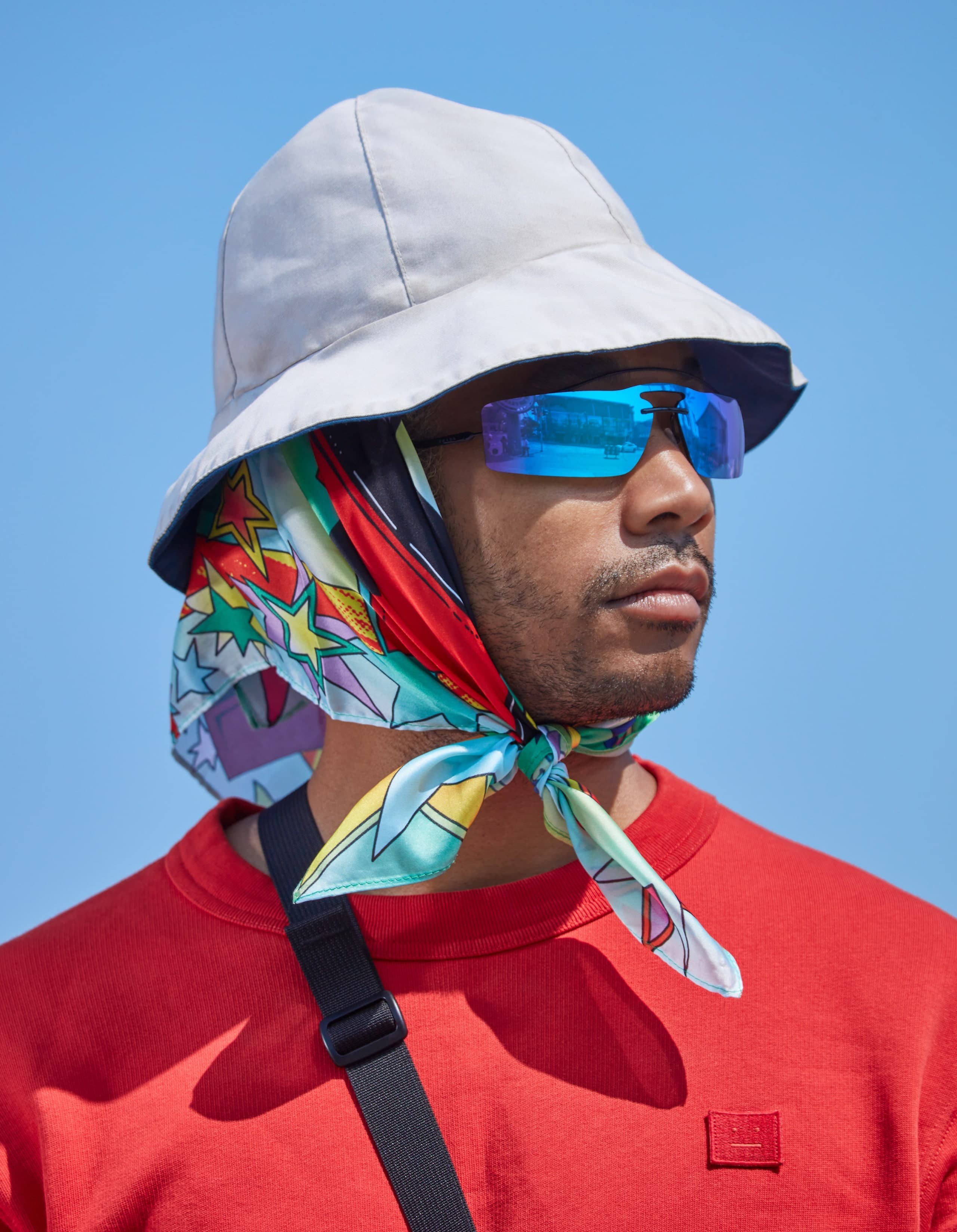
Throughout Mahal, it feels like we’re literally going on a ride with you in your Jeepney. Was this your intention?
It’s a very obvious journey, there are the sounds of the Jeep. There’s also a bit more of a metaphorical journey too. You can hear it in the lyrics, where each song gets deeper into my character. It’s somewhat planned, but I don’t want to completely tell the listener what to think or what to do. But I do enjoy movies and albums that have a beginning, a middle and an end.
In tracks like ‘In the Loop’, there’s also a real theme of movement. I kind of saw it as a response to the pandemic, we’re allowed to move around now, finally…
Oh, totally. The whole idea of the Jeepney did derive from wanting to do some sort of marketing strategy that was pandemic proof. At the time, when I was thinking about it, no one was able to play in venues, and even if Covid-19 does pop up again in the next few years or something. I wanted to do something where we can just drive the music out to the people, whether it be a coffee shop or a record shop. It’s essentially this guerrilla style marketing campaign. I was planning on getting a 2022 regular Jeep, and turning it into something traditional, but we found this Jeepney. Now, that’s kind of perfect.
It’s cool. So the Jeepney is a Filipino national symbol, and you’re half Filipino, of course. I’m guessing it was a nod to your heritage?
For sure. When I was having these conversations, we did feel like maybe I was pushing more towards a cultural tie, but I’ve never really aspired towards that. I’ve always sort of tried to strive for this amalgamation, this mix of cultures. I’ve never really gone straight for Filipino or Black culture, I’ve always been sort of like, ‘you can’t tell which way I’m going’ [laughs]. But I guess, it felt like the right time to put some cultural signifiers out there and really sort of represent… But also, again, it was timing. I wasn’t trying to find this Jeepney. We were looking on the internet for any old Jeep and I happened to stumble on this. It was a very cosmic alignment thing where I felt like it was calling me. The Jeepney was in the US already, it was built in the Philippines and shipped here in the 60s, I figured I should just go for it, and everything sort of made sense after that. It’s a bit of a documentary in my eyes, it’s not really a fantasy. When you hear the Jeep breakdown on the record, that’s happening to us in real life. And actually, the title of the album Mahal was inspired by the fact that we found this Filipino vehicle, so if we didn’t have an authentic Jeepney, I don’t know if I would have named it Mahal.
Has your Filipino background influenced you musically at all?
I definitely grew up around it at my grandparents’ house, but that’s about the extent of it. I never really sought out Filipino music until a couple of years ago. I did this cover of Joe Bataan called ‘Ordinary Guy’ and that was around the time that I was really hearing something that I could relate to. I think as a kid, you just hear old recordings and class it as old music, you don’t really hear the grooves or the production. So to revisit, that stuff now kinda informs me of how much influence there actually was. It’s kind of crooner like, it’s not too performative or introverted or bedroom, it’s very ballad-esque and I think there are some tracks on the record, like ‘Millennium’, for example, which has that Filipino pop sound to it.
Definitely. Do you feel a bit more connected to that side of yourself now, through exploring it musically?
In a way, yeah, I definitely feel closer. I feel like I have earned some cred in a way. It’s rare to be in this position as a Filipino in the pop music scene, there are only like a handful of Filipinos, so it feels cool. I kind of find myself wanting to like resonate more with other Filipino stars, and just trying to show some alignment in like what exactly a cultural sound could be, because Filipinos are naturally mixed, they’re Asian and Spanish from like the 1800s. There’s that Latin influence and there’s that Asian influence and for it to come out in this crooner-type Americanised ballad sound is very interesting; it’s already kind of a mixed colonised sound by default. It’s interesting to flip that and try to really recreate a sound, but it’s a challenge because it’s anonymous almost at the same time. It’s hard to really pinpoint what a Filipino sound is.
It’s cool, it probably gives you a lot of room for experimentation, because nothing is exactly right or wrong?
Pretty much yeah, you can’t go wrong as long as you’re Filipino.
So I did a little translation of ‘Mahal’, and for me, it translates as ‘expensive’. Is that right?
That’s one of the definitions. It means ‘expensive’ and it also means ‘love’, but I think it equates to the word ‘valued’, as in, ‘we are highly valued’. I do think this record is represented by that, and that’s why I named it Mahal because it’s somewhat of a non-expensive sound, but it’s more of a very expensive process and had some financial risks involved with the Jeepney. I’m just trying to portray luxury in a way that’s obviously Filipino. Going back to the sound of ‘Millennium’, it’s very silky and smooth, and some of the drum sounds are very big and to my ears expensive sounding. It’s got a lot of warmth.
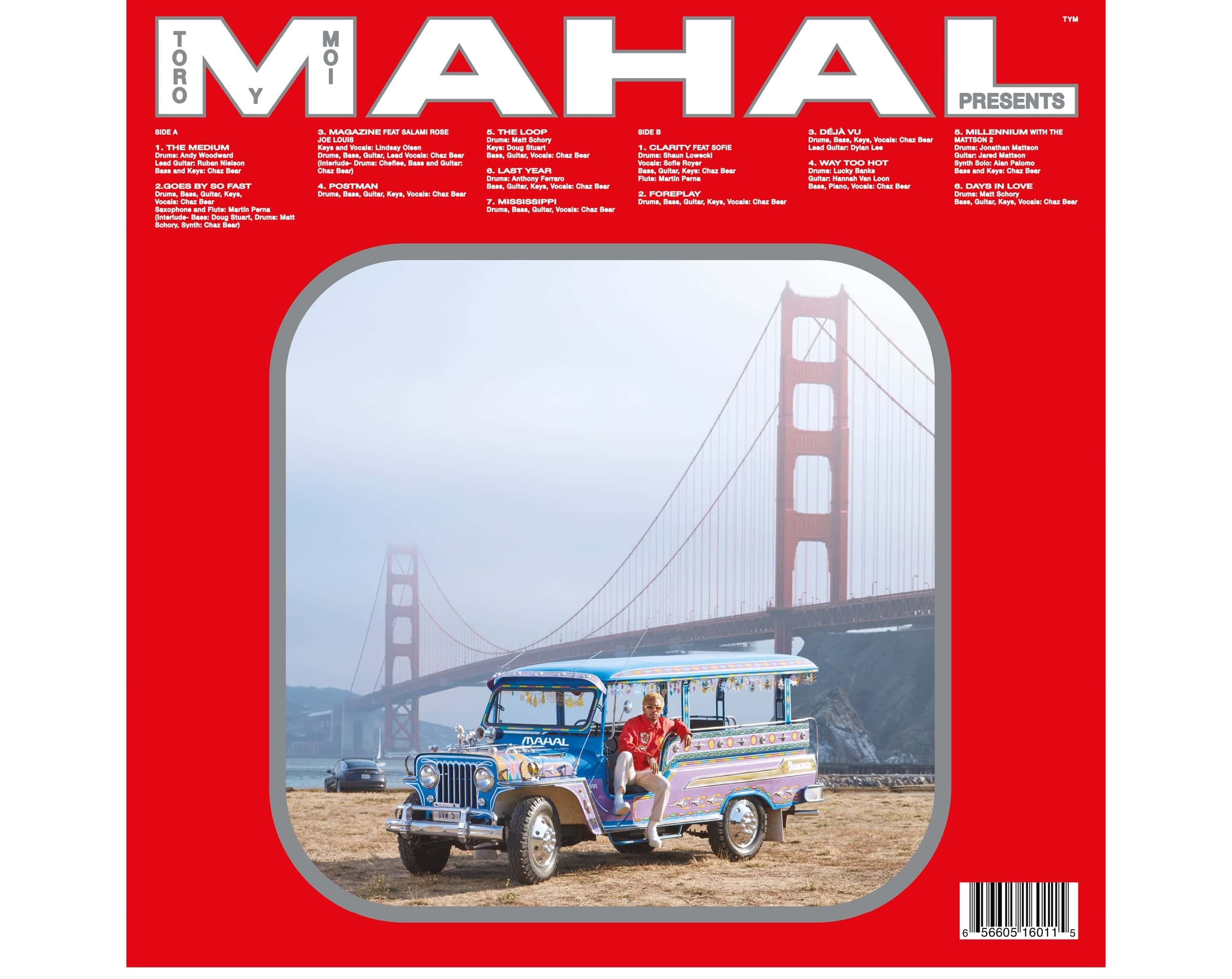
Why were you so taken by that kind of idea of value?
Yeah. I think I wanted to again elevate Filipino culture, specifically. You know, with hip hop and black music, we have already established an aesthetic of elevated luxury and stuff like that. I felt like it was the right time to do that for Filipino music and artists. I’m not one to wear chains and buy luxury cars, but I will buy a historic Filipino artefact. I try my best to flip that and make it hip and relevant again, I feel like it can be in a similar lane to what hip hop is like. A lot of what I’m doing with this rollout, and its imagery, is adopted from hip hop; there’s this machismo to it and an audacity.
The idea of bringing luxury to a heritage that isn’t necessarily associated with it is very interesting. I know you’ve previously said that you don’t want to be pigeonholed, so why did you feel like now was the right time to explore both sides of your identity, so to speak?
I feel like I’ve represented my Black side throughout my entire career, I’ve never really focused on Filipino culture, partially because it gets overlooked everywhere. It’s not just with my fans, but even as a mixed American, I kind of feel like everything gets centred on the Black side, which is fine. But I think it’s my responsibility and duty to pay respect to the other side. In general, I feel like I would have gone in this direction even before the pandemic, we recorded ‘Ordinary Guy’ in 2018. I think it’s more important than ever to become a cultural ambassador, and really just represent. A big influence was Virgil Abloh and the way he flipped culture and fashion, and the way we look at commercialism, so he’s the archetype there.
One thread that I picked up on in the album was to do with connecting/disconnecting from the digital world. We all used social media so much during the pandemic, as you know. Any thoughts on that?
A lot of the themes on the record do touch on digital culture and how that relates to me and as an artist who’s working on this conceptual record that’s obviously inspired by the 70s. I wanted to make sure this wasn’t a full on reaction to the times, and I wanted to find the balance between that and appreciating what digital culture can provide. I didn’t want to make a record that alienates me as anti-digital.
As an artist, you’ve always been quite private. What is your relationship with social media now, has it changed at all?
It’s somewhat healthy. I have a team too that helps me keep up. I’m more of a fan though of talking to those 1000 people on my Discord as opposed to the 300k on Facebook or something. If you really want to talk to me on the internet, there are ways to find me, but I do prefer to not interact other than when it comes to business. But it’s changing with TikTok and I’m just taking a step back to really analyse what platforms are helpful or useful. I really see social media as a tool, but I definitely get hooked like everyone else.
In Mahal, do you have a song that you’re the proudest of? Or one that resonates the most emotionally?
I think ‘Days in Love’ is one of the songs that I feel like you’re one of the strongest, just sonically and lyrically, as I’ve never really gotten a chance to touch much on the prog territory. Also lyrically to write a song about recognising that you’re falling out of love is kind of cool. For me, it represents where we are as a society now. It could be aligned with the idea of too much of a good thing is a bad thing — maybe it’s too much music, too much news, too much internet. Too much of anything forces you to be turned off by it. And to have that in the record is a good closure because not only does it bring closure to the trip, but it also closes my thesis of the whole thing. The first track on the record is called ‘The Medium’, which is a very, super subtle commentary on media and the culture, and how we’re consuming too much of it in general. Like, we could just go for a drive.
Yeah, totally. And then in regards to what’s coming up for you, are you excited to reconnect with fans and tour?
Yeah, I have some dates coming up and I’m looking forward to playing some shows. I’m not really going on the road for that long these days, I personally feel like it’s a complete loss of my personal life as an artist and as a husband and a dog dad. ‘Days in Love’ is what that’s about; pulling the reigns back a bit and slowing down. The world’s not opened all the way up, and we’re at war, so let’s just chill maybe. I need to be happy on stage, for it to not feel gruelling would be nice. Sometimes it’s insanely stressful on your body, and your immunity is at risk. I’ve heard of bands who have had to cancel their tours before they even start with Covid. Do we need to do live things all the time in person if it’s putting people at risk? My thinking is that I want to do more residencies, more things in one city, smaller shows, and secluded spaces. I think that’s where things could be going.
Yeah, to be fair, the way you’ve conducted yourself over the past decade or so has always been like that — which I admire!
Yeah, I look at it like I’m a shop owner or a brand or a company. Do I want to be a big monster brand? Or do I want to be a more boutique brand that’s a destination that you come and see when you’re in a certain town or city?
